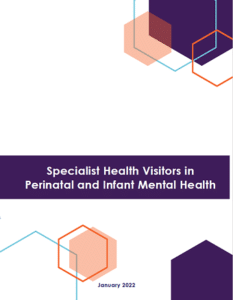21st January 2022
Oxford University study recommends commissioning of Specialist Health Visitors in Perinatal and Infant Mental Health throughout UK to tackle growing social cost issue
Oxford University has published research examining the training and qualifications of Specialist Health Visitors in Perinatal and Infant Mental Health (Sp HV PIMH), and their role in supporting health visitors and families at risk of /or experiencing mental health problems during the perinatal period.
The report recommends that Sp HV PIMH should be commissioned throughout the UK to tackle this issue, which has an extremely high social and financial cost. Currently, Sp HV PIMH constitute just 0.8% of the health visiting workforce (in England). The Oxford research found that in some areas Sp HV PIMH posts had never been funded, and in other areas the funding had been discontinued or cut – these were cited as the biggest barriers to the promotion of perinatal and infant mental health.
Perinatal mental health issues can have a devastating impact on women and their families, and results in a financial cost of £8.1 billion for each one-year cohort of births in the UK, with 72% of this cost relating to adverse impacts on the child. As such, maternal and family mental health has been designated as one of six high-impact areas for the health visiting workforce.
Abigail Reynolds, a mum with lived experience, shared:
“I was diagnosed with severe Anorexia Nervosa in early 2019, when I was seven months pregnant with my second child. The past three years have been unimaginably challenging, but my health visitor‘s support throughout my illness and recovery has enabled me to rebuild my life, to learn how to care for myself as well as my children – and to believe I am worthy of that care – and to gain the confidence to begin using my personal experience to help educate and support others in both the eating disorders and perinatal mental health areas.
“Health visitors are so well placed within the community, and have a unique opportunity to build trusting relationships with the whole family to support family mental health – they are a vital part of the system.”
The study surveyed 41 Sp HV PIMH and 3 Perinatal and Infant Mental Health Champions, who described their casework as focusing on areas such as parental antenatal depression, antenatal anxiety, general anxiety, birth trauma, postnatal depression and panic attacks, using a range of interventions including listening visits and motivational interviewing amongst others.
Survey respondents reported current barriers to the promotion of PIMH as being a lack of funding (82.3%) and a lack of understanding among commissioners about PIMH (64.7%) and the role of HVs in PIMH (73.5%) – with the discontinuity in funding that has occurred over recent years being perceived to have led to a constant need to reinvent the wheel.
Melita Walker, Head of Mental Health at the Institute of Health Visiting, said:
“We welcome this timely report which clearly sets out the important role of Specialist PIMH Health Visitors. Health visitors have a key role in supporting good family mental health. However, even before the Covid-19 pandemic, there were many system challenges to ensuring that all families had access to the right care at the right time. So this year, more than ever, the time has been absolutely right to have a focus on leadership – the role of the Specialist Health Visitor in Perinatal and Infant Mental Health and how a well-resourced health visiting service, as part of the PIMH system, can maximise the opportunity for good family mental health and wellbeing.
“The timing of this report fits very well with priorities for family mental health and the Government’s recent commitment for PIMH in the last budget. Its recommendations echo what national think tanks, such as the Maternal Mental Health Alliance and the First 1001 Days Movement, are campaigning for and provides policy makers and commissioners with sound evidence to improve family mental health through an effective health visiting service.”








